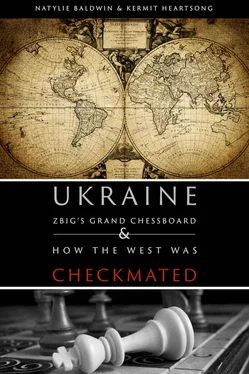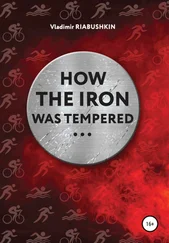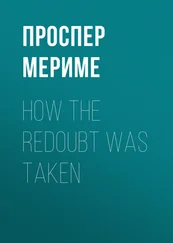Kermit Heartsong - Ukraine - ZBIG's Grand Chess Board & How The West Was Checkmated
Здесь есть возможность читать онлайн «Kermit Heartsong - Ukraine - ZBIG's Grand Chess Board & How The West Was Checkmated» весь текст электронной книги совершенно бесплатно (целиком полную версию без сокращений). В некоторых случаях можно слушать аудио, скачать через торрент в формате fb2 и присутствует краткое содержание. Год выпуска: 2015, Жанр: Политика, на английском языке. Описание произведения, (предисловие) а так же отзывы посетителей доступны на портале библиотеки ЛибКат.
- Название:Ukraine: ZBIG's Grand Chess Board & How The West Was Checkmated
- Автор:
- Жанр:
- Год:2015
- ISBN:нет данных
- Рейтинг книги:4 / 5. Голосов: 1
-
Избранное:Добавить в избранное
- Отзывы:
-
Ваша оценка:
- 80
- 1
- 2
- 3
- 4
- 5
Ukraine: ZBIG's Grand Chess Board & How The West Was Checkmated: краткое содержание, описание и аннотация
Предлагаем к чтению аннотацию, описание, краткое содержание или предисловие (зависит от того, что написал сам автор книги «Ukraine: ZBIG's Grand Chess Board & How The West Was Checkmated»). Если вы не нашли необходимую информацию о книге — напишите в комментариях, мы постараемся отыскать её.
Ukraine: ZBIG's Grand Chess Board & How The West Was Checkmated — читать онлайн бесплатно полную книгу (весь текст) целиком
Ниже представлен текст книги, разбитый по страницам. Система сохранения места последней прочитанной страницы, позволяет с удобством читать онлайн бесплатно книгу «Ukraine: ZBIG's Grand Chess Board & How The West Was Checkmated», без необходимости каждый раз заново искать на чём Вы остановились. Поставьте закладку, и сможете в любой момент перейти на страницу, на которой закончили чтение.
Интервал:
Закладка:
With President Clinton continuing to support him, the US congress voting to provide $2.5 billion to his government, and the American mainstream media cheering him on while painting the Parliamentarians in Orwellian terms as Communist hangers-on and backwater anti-democrats, Yeltsin sent troops in to surround the Parliament building and ordered all utilities cut. Klein reported that Boris Kagarlitsky, director of the Institute of Globalization Studies in Moscow, and present at these events, told her that supporters of Russian democracy
… were coming in by the thousands trying to break the blockade. There were two weeks of peaceful demonstrations confronting the troops and police forces, which led to partial unblocking of the parliament building, with people able to bring food and water inside. Peaceful resistance was growing more popular and gaining broader support every day. (Klein 2007)
Word came out at this time that Polish citizens had just voted out the party that had forced “shock therapy” on them. Consequently, Yeltsin’s advisors saw early elections to break the standoff as too risky. Shortly thereafter, Yeltsin’s troops fired machine guns into a crowd of mostly unarmed demonstrators who had marched to a major television station to demand announcement of their heightened opposition to Yeltsin’s rule. This was followed by Yeltsin’s orders to storm the Parliament building and destroy it. As Klein sums up the episode that killed around 500 people, wounded 1,000, and forever changed the direction of Russia:
Communism may have collapsed without the firing of a single shot, but Chicago-style capitalism, it turned out, required a great deal of gunfire to defend itself: Yeltsin called in five thousand soldiers, dozens of tanks and armored personnel carriers, helicopters and elite shock troops armed with automatic machine guns — all to defend Russia’s new capitalist economy from the grave threat of democracy. (Klein 2007)
A sample of headlines from US media outlets reporting on this turn of events included, “Victory Seen for Democracy” by the Washington Post and “Russia Escapes a Return to the Dungeon of its Past” in the Boston Globe . Clinton even sent Secretary of State Warren Christopher to Moscow to congratulate Yeltsin on keeping Russia safe for predatory capitalism (Klein 2007).
By contrast, Putin has some authoritarian tendencies, which the West never tires of bemoaning, with casual epithets of “thug,” “gangster,” and “Stalin” tossed about; however, he has never rolled tanks into the streets, ordered Russian troops to fire on their own people, or destroyed government buildings.
Yeltsin continued to steamroll over any last shreds of democracy by dissolving elected bodies, suspending the constitution and the court, ordering military patrol of the streets, and imposing censorship. Meanwhile, with no Parliament to place a check on them, the Chicago School devotees — led by the HIID team — ran amok, implementing deep budget cuts, removing more price controls, and privatizing faster and more broadly.
The HIID team facilitated Chubais and other Russian predators' ability to create and fund private organizations whereby they could circumvent the Russian Parliament and other regulatory agencies, or be considered Russian or American depending on what was advantageous in terms of attaining wealth and resources or avoiding penalties and taxes (Wedel 1997).
In 1995, Chubais also ran the notorious loans-for-shares program that auctioned off state-owned companies worth billions for token amounts to a select group of Russians; however, the Harvard Management Company (HMC), which manages the university's endowment, and George Soros were two non-Russians allowed to partake in the pillaging. Both HMC and Soros ended up with significant shares in one of Russia's largest steel mills as well as in Sidanko Oil. Soros was involved in other speculative ventures in Russia and is reportedly eyeing similar vulture opportunities in Ukraine (Wedel 1997; Hudson 2014).
Western bankers enabled these kleptocrats in keeping the proceeds in offshore accounts, thereby evading taxes. Klein described the turn of events as follows:
A clique of nouveaux billionaires, many of whom were to become part of the group universally known as the “oligarchs” for their imperial levels of wealth and power, teamed up with Yeltsin’s Chicago Boys and stripped the country of nearly everything of value, moving the enormous profits offshore at a rate of $2 billion a month. Before shock therapy, Russia had no millionaires; by 2003, the number of Russian billionaires had risen to seventeen, according to Forbes list. (Klein 2007)
The oligarchs' wealth and power facilitated Yeltsin’s re-election in 1996. In fact, two associates of Chubais were caught red-handed leaving a government building with $500,000 cash for Yeltsin's campaign. Tape recordings later emerged in which Chubais and his accomplices are heard discussing how to hide evidence of their illicit activities and how to use PR tactics to deflect accusations of wrongdoing in the political sphere (Klein 2007; Hudson 2014; Wedel 1997).
Between 1992 and 1996, HIID alone received $57.7 million from US taxpayers via USAID for their “economic development” of Russia. The vast majority of that money was granted absent any competitive bidding, all with the blessing of five different agencies of the US government, including the Treasury Department and the National Security Council (Wedel 1997).
By now, the reader can probably deduce why Yeltsin — the hero of the West — was voted the least popular leader of the last 100 years by the Russian people. At the time of his departure from office, 90 percent of Russians polled did not trust him and 53 percent thought he should be put on trial (Wahlberg 2012; Cohen 2011).
There were, no doubt, other options that would have been more fair and acceptable among the Russian people. As mentioned previously, a full two-thirds of Russians polled during the transition period preferred co-ops as a more equitable means of privatization. An even higher percentage advocated for a government role in support of economic justice. Similarly, there were programs in development by Russians that would have facilitated a more distributist approach to privatization. For example, there was the idea for modest government-subsidized loans for the start of small businesses in various localities that was put forth by the Moscow city council member and shot down by Western advisors. Another program was designed by a Russian free market economist named Larisa Piasheva. Her program would have distributed property among average Russian citizens and would not have been dependent upon Western loans.
As Anne Williamson, a long-time American journalist who specialized in covering the Soviet Union and Russia, stated in her testimony before Congress on this topic in September of 1999:
When the administration says it had no choice but to rely upon the bad actors it did select for American largesse, Congress should recall Larisa Piasheva. How different today's Russia might have been had only the Bush administration and the many Western advisors from the IMF, the World Bank, the International Finance Corporation, the European Bank for Reconstruction and Development, and the Harvard Institute for International Development then on the ground in Moscow chosen to champion Ms. Piasheva's vision of a rapid disbursement of property to the people rather than to the “golden children” of the Soviet nomenklatura [elite bureaucrats].
…Clearly, an equitable and transparent privatization that would have delivered property widely to Russia's many eager hands should have preceded the freeing of prices. And during privatization, native producers should have enjoyed some protectionism at least, as did developing American industry and manufacture in the 19 thcentury.
Читать дальшеИнтервал:
Закладка:
Похожие книги на «Ukraine: ZBIG's Grand Chess Board & How The West Was Checkmated»
Представляем Вашему вниманию похожие книги на «Ukraine: ZBIG's Grand Chess Board & How The West Was Checkmated» списком для выбора. Мы отобрали схожую по названию и смыслу литературу в надежде предоставить читателям больше вариантов отыскать новые, интересные, ещё непрочитанные произведения.
Обсуждение, отзывы о книге «Ukraine: ZBIG's Grand Chess Board & How The West Was Checkmated» и просто собственные мнения читателей. Оставьте ваши комментарии, напишите, что Вы думаете о произведении, его смысле или главных героях. Укажите что конкретно понравилось, а что нет, и почему Вы так считаете.











